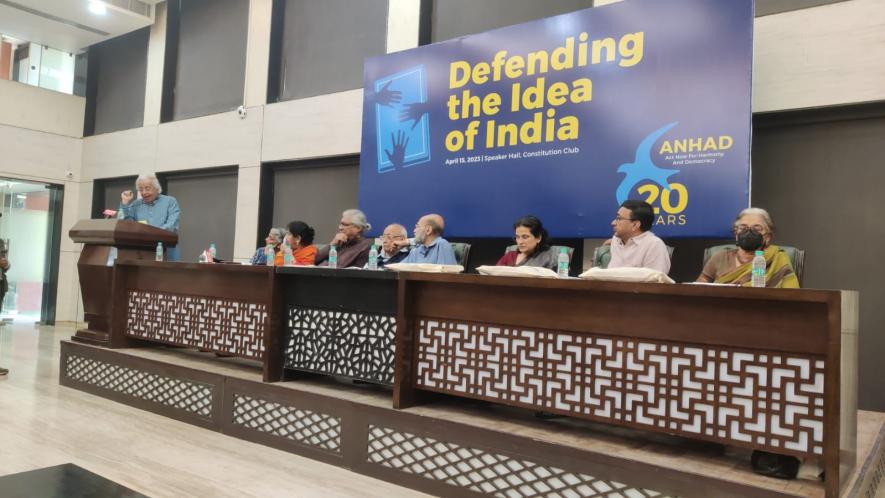
Photo courtesy: Anhad
Intellectuals, former civil servants, historians, economists, and academicians came together on the 20th anniversary of the formation of Anhad, a civil society group, at Constitution Club in New Delhi on Saturday to discuss the attacks on democratic institutions and defend the idea of India.
Addressing the gathering, Aditya Mukherjee, a renowned historian, said that the idea of India may have formed in the mid-nineteenth century, but it was very distinct from ideas of nationhood in Western countries. “Our leaders in the freedom struggle talked about sovereignty and democracy from the beginning. By sovereignty, they were referring to a state where people will be free from colonial slavery as well as be taking their own decisions,” he said.
“Mind you, Bal Gangadhar Tilak was talking about the adult franchise in the 1890s. Western democracies like America were discussing in the 1960s if black people will have civil rights. So, it was a quite revolutionary idea in the nineteenth century to envision democracy. […] Gandhi famously said that freedom of speech and civil liberties are the water of life and have you ever heard about water being diluted? So, it remained non-negotiable for Gandhi in independent India. For him, the right of association was simultaneously important,” added Mukherjee.
He pointed to the threat looming over civil liberties today and observed that even members of parliament are finding it difficult to organise a protest with the hurdle of Section 144 among other things.
“Respect for the opposition was equally important. But today, we see all versions of history where Nehru is posed against Gandhi, Patel against Nehru, and Bose against Nehru. However, in reality, they did differ in views but never disrespected each other. Secularism and inclusivity were equally relevant,” he said.
Mukherjee added that we should be proud of the fact we could envision diverse societies culminating into a nation. “The European Nation States emerged on the foundations of one language, one nation. If I go ahead, it was one nation, one sect. Look at France, catholic France, not even Christian. It was a multi-lingual society, but the French Revolution flattened it. Protestant England. They failed to recognise our diversity and rebuked us by saying that we are just a geographical expression between longitude and latitude called South Asia,” he said.
According to him, the second big differentiator that stood out for India was that nationalism here was “humane”. “As European nation-states developed, they became imperial powers. The only people who differed were nationalists and loyalists. […] It is these loyalists and communalists who are in power today and they are borrowing the idea of one nation one language from personalities. It is well documented how Hindu Mahasabha leaders sought an audience with Mussolini and came back to implement his ideas,” he said.
“We are getting clarifications from the NCERT director that the syllabus and text in the books have been revised to lessen the load on students but it is an open secret that Mughals have been erased to demonise the Muslim community, to push them into ghettos in order to prevent them from sharing their pain with rest of the Indians,” said Mukherjee.
Ashok Vajpayee, a noted poet and former ambassador to Poland, said that the leaders of the BJP are using the text of epics like Ramayana and Mahabharata to justify their crimes. However, a reading of these texts suggests otherwise.
Citing an example of Van Parv in Mahabharat, Vajpayee said that Vyas argued against enmity between religions. “A religion loses its meaning if it hates the followers of other religions. Similarly, A religion’s existence is in danger if its followers question others,” he said.
He said that the essence of the text suggests a very long journey of religious philosophies in the country. It is in this discourse Buddhism, Jainism and Sikhism emerged in this country. “If everything was right with the Hindu religion, why would have these religions appeared? Second, Hindutva is the illegitimate version of Hinduism and has completely distorted the latter’s meaning. Thus, the fight is to protect the religion from opportunistic tendencies,” said Vajpayee.
Anjali Bharadwaj, an RTI activist, said that idea of India also represents a nation where people have the right to ask for information to ensure less corruption and transparent administration.
She said that the anxiety of ruling party members can be understood from the sentence of a national minister who had said that “people’s responsibility to ask questions ends with elections”. He was addressing the mediapersons after an encounter in Bhopal.
“If people are exercising their right to information for better governance, they are being killed. As per available data, 90 RTI activists have been killed. I fail to understand the fear in the ruling party that there is no permission to protest at a designated place like Jantar Mantar where we saw people converging in thousands to express their anguish. The NREGA workers are sitting for 50 days, and the permission is denied if the participants are more than 50 whereas we saw a meeting of Hindu extremist groups with swords and batons,” she said.
She added that institutions which were responsible for ensuring a smooth flow of information are being attacked. “We had to go to Supreme Court every time to seek the appointment of information commissioners. In nine years of this rule, not a single commissioner was appointed without a court battle. It came into power with the promise of Jan Lokpal but did not appoint them until 2019 before the elections. So, it has been a difficult struggle though it must be fought to defend the idea of India.”
Among other speakers who addressed the conference were historian Mridula Mukherjee, economist Santosh Mehrotra, political scientist Zoya Hasan, journalist Pamela Philipose, and lawyer Vrinda Grover.
Courtesy: Newsclick
